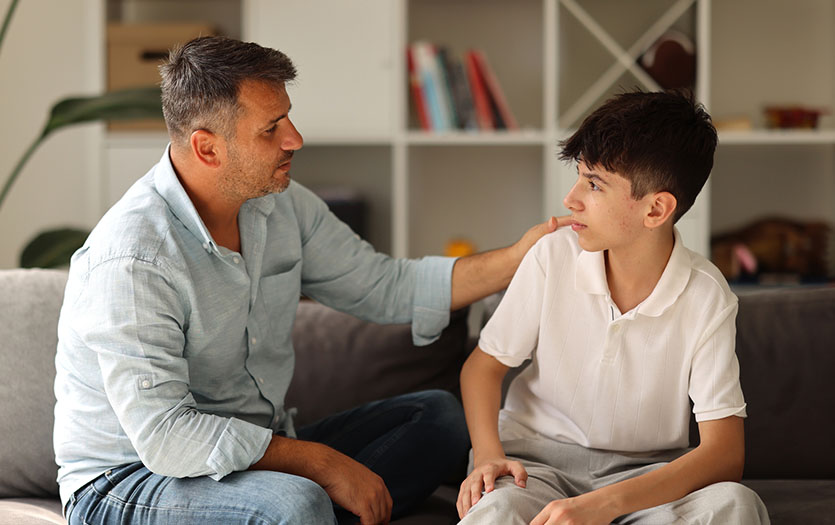
This post was written by Manpreet Khemka, MD, PPG – Psychiatry.
"I was tired of trying to be happy and stay positive. I was tired of reminding myself that my family loved me unconditionally when they all hated me and stabbed me with their words and actions every single day. It was getting unbearable. I decided to end my life and took the pills. I woke up in the hospital bed, with my parents next to me. My mother was tearful, and my father was angry as I told them what I had been facing in school every day for the last few months. They asked me why I never told them anything about it. I thought to myself, how could I? They wouldn't have understood."
This was a brief part of my conversation with a 12-year-old girl who was admitted to our hospital after a suicide attempt. She had overdosed on several medications she found in the kitchen cabinet, with an intent to die. She was physically out of danger but psychologically and emotionally fragile.
Her words echoed in my mind as I drove to pick up my children from school after work. "How could I have told them what was happening at school? They wouldn't have understood." As I watched my children's carefree faces, I prayed for their health and happiness, for a safe environment in their schools, and for me to be a parent with whom they could trust completely and share anything.
Parenting doesn't come with an instruction manual. However, a thoughtful and open-minded review of do's and don'ts may help us be better prepared, especially when our children need us the most. The intention of this post is to empower parents to support their children to the best of their capacity, especially when they are being targeted at school.
Understanding bullying
Bullying is a common problem that many students face in school daily, regardless of their age. In my practice as a child and adolescent psychiatrist, I have heard stories of bullying in elementary, middle and high school. Bullying is defined as the use of one's strength or status to intimidate, injure or humiliate another person repeatedly, and may be:
Physical – Causing or threatening to cause physical injury.
Verbal – Teasing or insulting someone repeatedly through mean, cruel words, name-calling, body shaming, or commenting on their race, skin color or family status.
Social – Using peer rejection or exclusion to humiliate or isolate someone, telling them no one wants to play with them or likes having them around, targeting the student and ensuring they know about it.
Offering your child support
Bullying affects a child's sense of self-worth and may affect their emotional and physical well-being. What can we do as parents when we find out that our child is a target of bullying? Here are some steps to consider:
Create a safe, happy, healthy home for your children to return to.
Consciously create a culture of belonging in your home, despite individual differences. Stay connected to your children. Take an interest in what they like. Make room for "them time" to connect to them, heart to heart. Create time together to relax and unwind based on their interests and likes. Make this time gadget-free.
Some suggestions could be:
- Going for a walk or bike ride
- Playing musical instruments
- Drawing
- Cooking or baking a new recipe
- Watching a sunset
- Going to their favorite restaurant/coffee shop
- Playing board games
- Learning about their favorite artist or book
Be curious and genuinely interested in learning about their life, likes, dislikes and seeing the world through their lens. Let unconditional love and acceptance not remain nouns you use but verbs you act on. When your child feels secure and has a sense of belonging, they can be open to sharing the aberrations in the outside world.
When your child opens up about being targeted in school, you must ensure this communication channel stays open.
They have a lot to process, both factually and emotionally. Understandably, it hurts when we find out that our child is being targeted at school. Our reactions can range from shock, disgust and anger, to denial, helplessness and resentment toward the bully and sometimes the authorities who are failing to create a safe environment at school or not responding the way we expect them to. Remind yourself that it's not about you. It's about your child feeling heard, understood, validated and supported.
Listen in a way that encourages your child to open up.
Sometimes, parents can unintentionally shut down this bridge of communication through their reactions, both verbally and nonverbally. Remember that your maturity level and experience may differ. What might seem petty to you may be troubling your child to an unfathomable extent.
Validate their feelings.
Hold their hand, hug them, let them cry on your shoulder or hold them close if they want you to. Do whatever comes naturally and intuitively as a parent to comfort them through the complicated feelings they are experiencing. Maintain a firm stance on validating their emotions, not maladaptive actions.
What to avoid when supporting your child
When kids open up to me, sometimes they tell me about their parents' responses and how they perceive them as not being good enough, not being strong or causing family dysfunction because of how they were impacted by bullying. Your child is already going through these feelings of not being good enough and being a burden. Be extremely conscious not to reinforce the same feelings with your words.
Refrain from these common phrases and reactions:
- Normalizing bullying: "It's okay. It happens to everyone. It’s just part of growing up. “What doesn't kill you makes you stronger."
- Dismissing their feelings: "Come on. I can't believe how you let this affect you so much." "You are beautiful. Don't you know?" "You are too sensitive."
- Blaming the victim: "How many kids are in your class? Why are you being singled out and bullied?" "Tell me what you did first." "I am tired of your same old, same old emotions. I can't sleep at night. We can't have any fun as a family anymore because of you."
- Rationalizing and sympathizing with the bully: "They are just insecure themselves. Maybe they are jealous of you. They may not have a good home like you do."
- Interrupting them and being present half-heartedly: "Okay. Let's get ice cream. It will cheer you up." "Let's watch a movie together and forget about it."
- Letting distractions happen: Allowing interruptions from siblings, spouse and social media.
- Outsource the safe space: Believe it or not, I have seen patients in the clinic whose parents told them that they needed to see a therapist and talk to a professional about their feelings when they started opening up about what they are going through.
You cannot take away the sting of sadness, hurt, or insult that they are feeling at the moment. But you can listen and help them process their feelings in a safe space. Listen intently to their spoken words and unspoken feelings. Listening will help them calm themselves and work toward resolving their feelings. Listening will also help you find out what exactly is happening, its seriousness and what the next plan of action should be.
What to do with the information your child shares
When you have the information from your child about what is happening:
- Have a straightforward narrative. Make sure you have talked to your child sufficiently to have a coherent narrative of what is happening. Note everything relevant: the names of bullies, when it happened, what they are saying/doing, the place where it happened, any bystanders and their responses, and any staff response in a given situation. Getting the school's cooperation starts with getting the story from your child right.
- While younger children may not object to you discussing the issue with their teacher, middle and high schoolers may not be on the same page with you about getting the school involved. They may fear repercussions from bullies or a lack of confidence in the school system. Assure your child they are not alone and don't have to suffer alone. Assure them that the bully may feel empowered even more if silently endured. Proceed with the next step after talking to your pre-teen or teenager in confidence. Keep them in the loop and be open to their feedback. Suggesting to meet a trusted teacher in school may be the point of start that they may be more open to.
- Request a meeting with the teacher as soon as possible. I suggest a written request through email, clearly mentioning the reason for requesting a meeting in person. Keep the email brief and to the point. Teachers' email addresses are usually listed on individual school's websites.
- It is always a good idea to start with your child's teacher. Suppose there is no response or effective intervention. In that case, you may have to involve the school principal and, at times, the superintendent and board of education.
Suggestions for talking to your child's teacher
While this step can be intimidating to children and parents alike, remember that being prepared and presenting the problem confidently reflects that you are placing your trust in the teacher and seeking a solution together to make your child feel safe.
- Ask the teacher if he or she knows your child is being bullied. If so, what has he/she noticed and what did the teacher do when he/she noticed this?
- Share what your child has brought to your attention.
- Ask the teacher what the action plan is and what the teacher would do if, say, X pushes your child again, calls her names, or is derogatory towards her family. Write it all down.
- Set up a time to call the teacher back to review this and discuss what they did to end the bullying. Don't let any more than five school days pass.
- Show appreciation for the time taken to discuss this crucial matter.
If nothing changes, reaching out to the principal is the next step.
Suggestions for talking with your child's principal
- Introduce yourself and request a meeting as soon as possible.
- Clearly specify the reason for your concern and how meeting your child's teacher has not prevented your child from being bullied.
- Be present, on time and educate yourself about the school's anti-bullying policy before the meeting.
- Show up prepared with brief written notes about your child’s experience, the steps taken so far, and whether they have been effective. If there has been any worsening, bring that up, too.
- Maintain a respectful tone throughout the conversation.
- Ask how you can work together to improve the situation for your child and other schoolchildren experiencing similar situations.
- Have an action plan and end the meeting by thanking and reinstating what was discussed so you can handle the situation together.
- It is essential to write notes about everything! Your active engagement conveys that you are watching the situation and expect intervention with favorable outcomes. Your child is also watching your unconditional support through action, which will empower them and make them feel they are not alone.
- Send a thank-you note and reiterate the principal's main points of discussion and commitment to ending bullying. Make sure to copy the school district superintendent in that email. Accountability is the key.
What if no steps are taken to address the issue?
If the school fails to address the issue and your child is being targeted, a higher chain of authorities may need to be involved, like including the school district superintendent and board of education.
Going through all these steps may be emotionally and psychologically taxing for you and your child. Keep an open channel of communication and address their psychological needs. If needed, don’t hesitate to seek professional help from a counselor. Maintain a healthy lifestyle and encourage creative outlets and positive connections with supportive friends and family. Stay grounded and focused.
Remember, it can be a challenging world for children outside the bubble of your home. Your support, guidance and unconditional love will help them overcome challenges.
Call the PBHI HelpLine at 260-471-9440 or toll-free at 800-284-8439, anytime, 24 hours a day. Our experienced specialists can answer your questions, provide recommendations and help arrange care.



